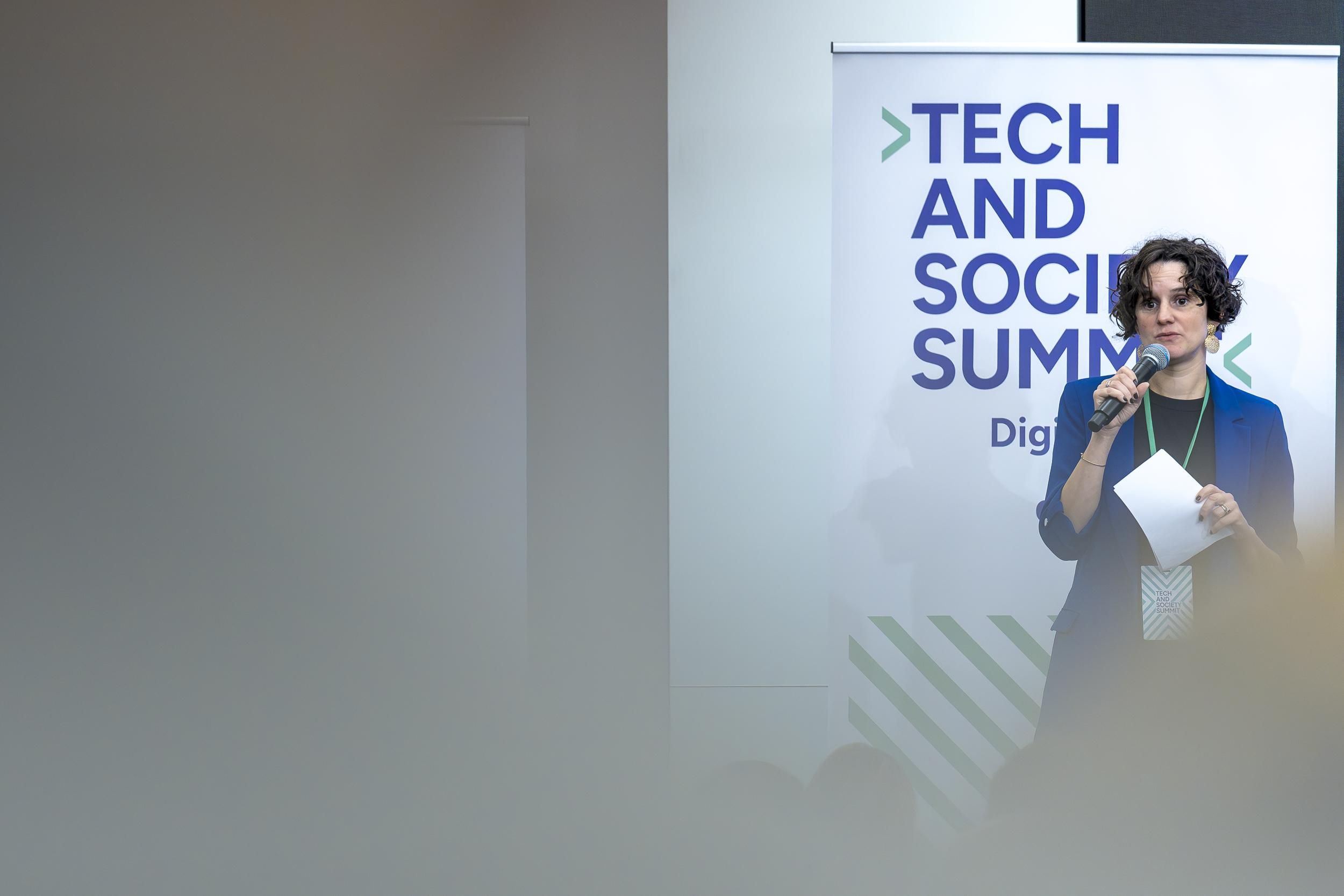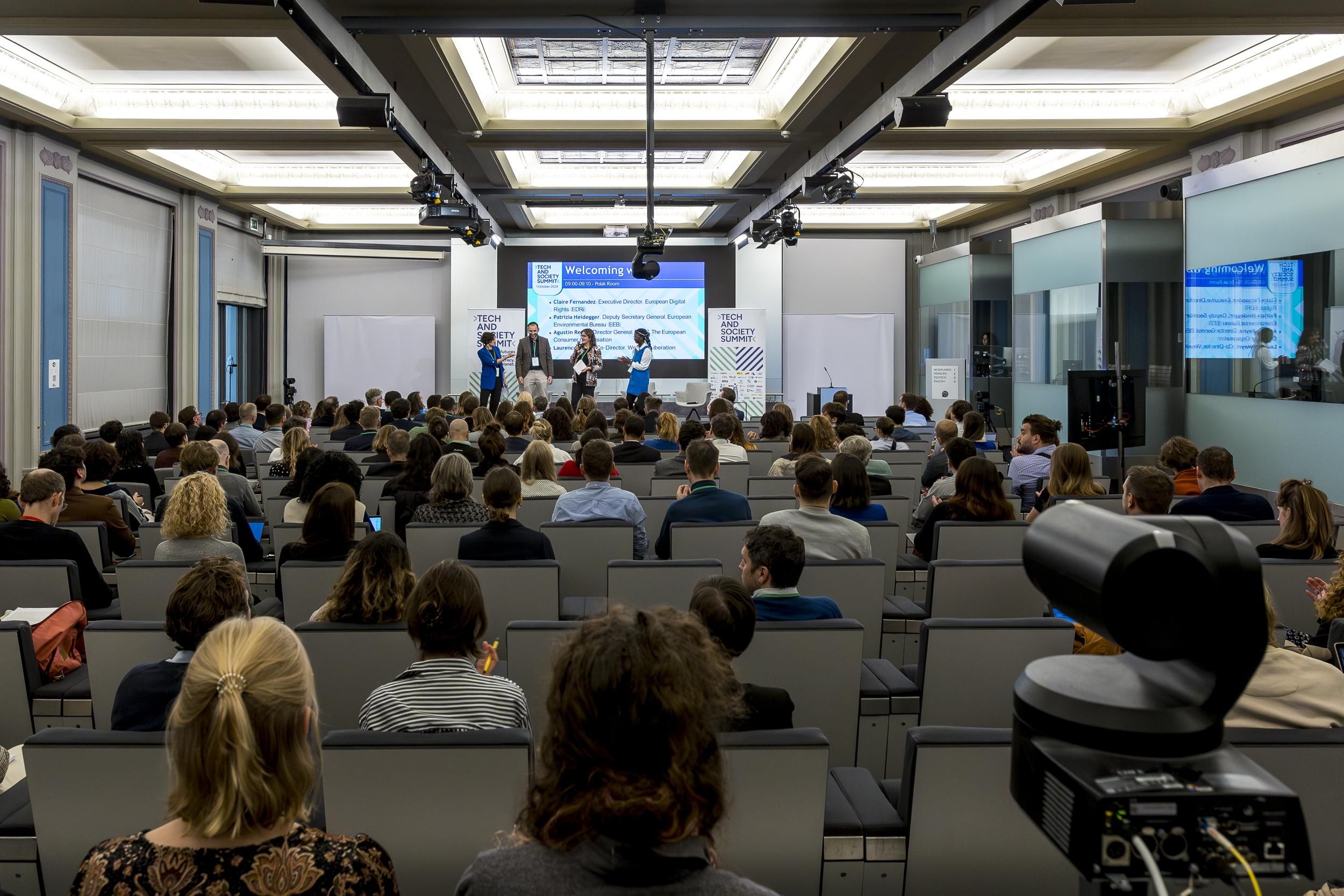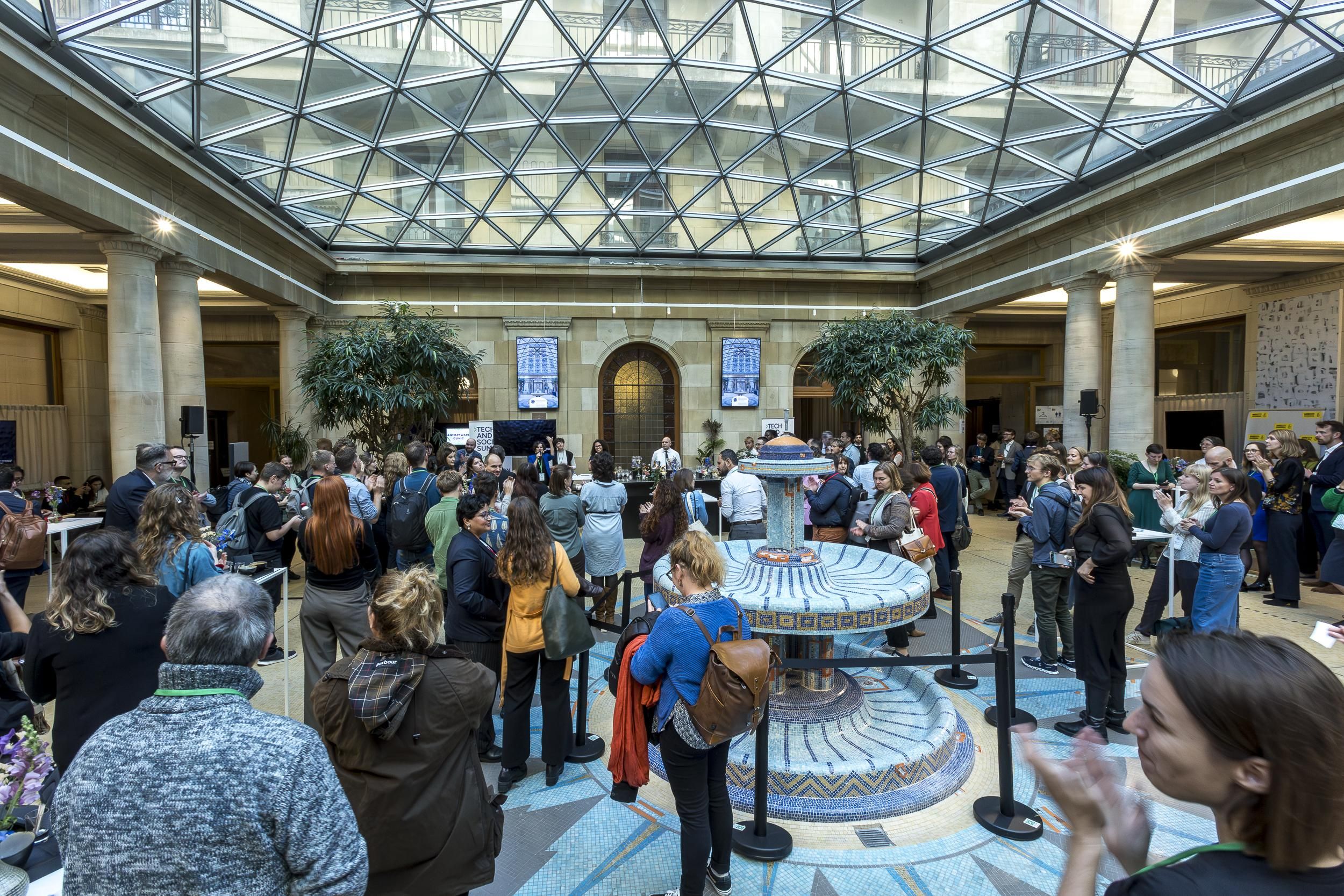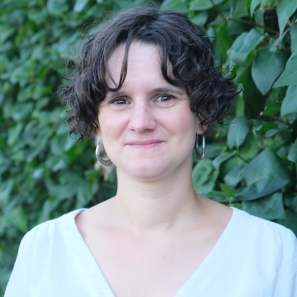Tech and Society Summit: Decision-makers and civil society articulate a digital agenda that centers people, planet and democracy
On 1 October 2024, 41 civil society organisations – including EDRi – co-hosted the Tech and Society Summit. Throughout the day, EU decision-makers, journalists and civil society held discussions, joined panels and participated in activities that fostered dialogue about the intersections of technology, society and the environment.
First ever tech policy summit in Brussels led entirely by non-profit organisations
The Members of the European Parliament (MEPs) are about to vote for European Commissioner-designates chosen by Ursula von der Leyen. In an unsurprising but unfortunate move, most of the candidates are conservative and business-friendly and will likely lead to policies that support Big Tech and industries over people’s rights. In this version of the European project – illustrated by the Draghi report on EU competitiveness – Artificial Intelligence (AI), data and digital technologies will be used to enhance economic recovery and as a tool for the consolidation of various defence and securitisation agendas.
At this critical juncture, on 1 October 2024, 41 civil society organisations – among which were consumer, digital and human rights organisations, environmental and social justice groups, health organisations and corporate accountability organisations – hosted the first ever tech policy summit not financed by Big Tech corporations in Brussels, the heart of the EU.
We were joined by over 350 MEPs, other EU decision-makers, civil society representatives, and journalists. The event was able to create a bridge between civil society and new policymakers, to achieve accountable, people-focused policies that advance everyone’s digital rights.

Browse through the photo album!
NOTE: We ran out of green lanyards during the day so you may see some photos with people wearing red lanyards. We confirm that everyone included in the photos was comfortable being photographed.
Why a civil society summit like this matters
The opening remarks from host organisations reflected on why an event like the Tech and Society Summit matters. The Summit offered a proactive vision towards achieveing a just and green future,- where technology would serve the public interest and respect people’s rights, the planet’s boundaries and democracy. For that vision to be heard and realised, we used our collective convening power to call for decision-makers to be accountable to the public. And many of them responded – we had nearly 100 EU decision-makers attending the Tech and Society Summit. At a time when civic space is shrinking and many high level decision-makers choose to meet with Big Tech and industry representatives rather than other stakeholders, this event was a much-needed space.
The hosts also reminded the attendees about the many recent instances when civil society, including digital rights and consumer rights advocates, did manage to advance people’s rights and protection in EU tech law. Their words also raised the alarm about the transformative effects of digitalisation on our economies, society, politics, and the planet – and not always for good.
They ended their remarks by emphasising why events like the summit should support our collective imagination on the long path to justice – centering the needs of marginalised groups and affected communities in the Global South.
MEPs visions of tech and society
After the opening words by the organisers, MEP Kim van Sparrentak (Greens/EFA), MEP Anna Cavazzini, (Greens/EFA) and MEP Bruno Gonçalves (S&D) took the stage to share their visions for technology and society in the coming years.
MEP van Sparrentak spoke about countering addictive designs, and called for less siloed approached between environmental policies and technology regulation. MEP Cavazzini focused on demands around the right to repair of digital devices, and MEP Gonçalves made connections with fiscal justice to ensure accountability of Big Tech companies and to finance social protection in the EU.
Highlights of panel discussions
The first panel focused on digital austerity and the impact of the digitalisation of essential services on society. The panelists explicated how this process of digitalisation further excludes people experiencing poverty and contributes to a loss of autonomy for many of us. Technological tools such as discriminatory algorithms that serve policies of control, suspicion and austerity and are harder to contest once enabled– this is why civil society and groups working with disproportionately affected people are asking bans of these forms of social scoring. The session emphasised the need for human alternatives to the digital options and investment in social protection mechanisms.
The panel on breaking open Big Tech gave a warning to civil society activists and decision makers: we need to address the overall infrastructural issue with the business of computing. This is because Big Tech corporations are expanding their vision of production, and this ‘software industry’, as noted by Dr Seda Gürses, is deeply transforming our economies and institutions. Panelists argued that Europe should make use of all available tools to stop the spread of Big Tech’s toxic business model. We must think about alternatives that do not further entrench the power of Big Tech and, instead, promote economic justice.
During the panel about the environmental impact of technology, speakers gave a bleak description of the many – and mostly hidden – costs of the digital transformation. These range from extraction of materials, which is at the roots of war in the Congo, to high energy consumption, harmful emissions, as well as e-waste. Panelists offered alternative paths forward that do not focus on tech solutions to the climate crises– especially since the claims that digitalisation helps combating the crises are are highly disputed by experts. Instead, we need to focus on the solutions we already know work- cutting carbon emissions, reducing the demand on resources, and moving away from colonial ways of living and towards a circular and sufficient economy.
The last panel of the day was on visions of safety beyond surveillance. Sarah Chander, Director of the Equinox Initiative for Racial Justice, exposed the concept of ‘digital securitisation’, whereby digitalisation serves the securitisation agenda at EU level. This process leads to the deliberate criminalistaion of over-surveilled groups through the ever-expanding fusion of public safety, policy, military, border control. The panel also addressed the harms of the spyware industry, the missed opportunities to ban commercial spyware in EU law, and the expansion of Europol through various reforms. The panel ended with a call for social protection and welfare investments rather than punitive approaches.

Diverse round-tables and making people’s demands heard
The round-table on building a better internet explored why decision-makers need more awareness and understanding of the design of digital platforms and services, They must especially pay attention to the impact of these designs on people’s rights, specifically those of children, neurodiverse people and other marginalised groups . These issues can’t be fixed with patchwork solutions addressing the symptoms. Rather, we should focus on how these designs serve Big Tech’s agenda and how to undermine that. Enforcing the Digital Services Act (DSA) would give us some mechanisms but we still need more.
Conversations about building a healthy online public sphere continued in the round-table on tools for community-based alternatives. This discussion focused on the alternative examples we have from communities through which we can challenge large monopolistic platforms. Wikipedia emerged as an example of community governance, which also protects its volunteers.
The round-table discussion on the best practices for the EU institutions to engage with civil society started by acknowledging that the European Commission, along with other entities, has made progress in its willingness to cooperate with civil society. However, it is also clear that more needs to be done to achieve truly meaningful collaboration beyond just checking off civil society participating off a list. One way this can be done is through the institutions offering feedback to civil society organisations on the impact of their work. This is key for CSOs without direct access to institutions and can guide their future efforts. Moreover, responsibility for comprehensive investigations should not be on CSOs with their limited resources and already overblown workloads.
Attendees also reckoned with the nuances of promoting EU regulatory models as one-size-fits-all solutions around the world, with specific reference to the Digital Services Act (DSA). Panelists started by reminding the audience of the hyped concept of ‘tech sovereignty’, and invited reflections around states’ legitimacy depending on its people and their rights. The panel continued thinking about the limitations of the DSA within this framework. Examples emerged from Serbia and Brazil where platform regulation laws face several challenges.
Some organisations also used the opportunity of the Tech and Society summit to launch a new coalition to end commercial spyware abuse. This issue poses a severe threat to democracy, human rights and the rule of law. During a dedicated round-table, the coalition group called for a more active response from decision-makers to end the legislative vacuum around the abuse of this intrusive technology.
BEUC, The European Consumer Organisation, and EDRi also held a close-door round-table on the enforcement of EU tech legislation. During the high-level round-table, there was a broad consensus that we continue to face significant harms caused by various actors across the digital realm, particularly from big tech companies. Addressing these issues requires a holistic approach that considers the needs of society as a whole, rather than focusing solely on individual regulations. The significant disparities of outcomes of enforcement between Member States highlight an urgent need for greater regulatory convergence. As demonstrated by the GDPR, insufficient resources, gaps in expertise and knowledge pose a significant challenge to the effective enforcement of laws. Cooperation between authorities, regulators and civil society is essential.
During the Summit, we also took the demands of thousands of people across Europe to EU decision-makers – over 40,000 people supported EDRi’s recent petition calling on them to put people, democracy and the planet at the heart of our digital futures. The petition – co-signed by more than 30 civil society organisations – was received by seven MEPs.
Many opportunities for interaction and networking
In addition to the panels and round-tables, the Summit was also rich in other kinds of activities and interactions. Throughout the day, attendees could visit various Action Desks set up by partner organisations. These offered hands-on activities and expert advice on various topics.
Access Now and the Centre for Democracy and Technology Europe (CDT – Europe) ran an Anti-Spyware clinic where technologists checked participants’ phone for suspicious surveillance activity. This was a good opportunity for human rights defenders, journalists and decision-makers to realise how every guardian of democracy could become a target, which calls for urgent action against spyware abuse.
Right to Repair and Repair Together invited summit-goers to bring small broken devices to be fixed by their volunteers. This was a great way to show attendees how to expand product lifespan and reduce e-waste, as well as our ever-expanding demand for resource extraction.
Corporate Observatory Europe and LobbyControl proposed conversations, as well as a fireside chat, on the toxic impact of Big Tech lobbying on the functioning of European and Member States’ institutions. Fed by unlimited resources, Big Tech corporations increasingly use hyper-targeted and aggressive lobbying techniques, sometimes covertly.

Throughout the day, attendees could participate in an online quiz about the technological impact on the environment, organised by Friends of the Earth Europe and EDRi. We ended the day sharing interesting responses from the quiz, awarding the popularly-chosen winners, and with closing words from some of the host organisations.
The dedicated social moments and spacious venue allowed the participants to network, present their work, and co-conspire to progress the public-interest technology ecosystem further. We are grateful to all speakers and attendees for joining this one-of-a-kind event, which would have not been possible without the commitment of all 41 partner organisations hosting the event. Thank you to the EDRi funders who support our efforts year after year for us to be able to lead such an event. Thank you also to the funders who specifically supported the event: Civitates, MacArthur Foundation, Omidyar Network, Adessium Foundation, Green Screen Coalition, AI Collaborative (Omidyar Group), Luminate, Mozilla Foundation, ISOC.

The conversations started at the Tech and Society Summit are just the beginning. Civil society partners will continue to harness their collective power to call for alternatives to market and security dominated tech agendas. If you’re a decision-maker keen on making people-centred positive digital futures possible, get in touch with us.

